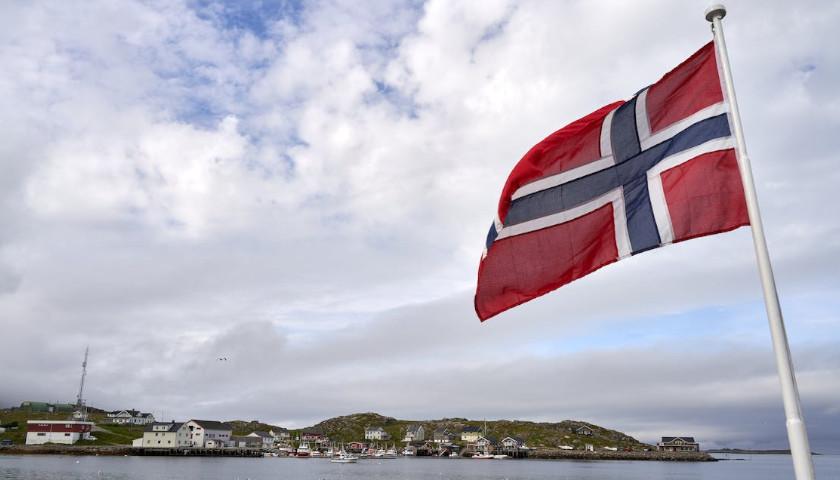by Bruce Bawer
When I moved to Norway from the U.S. in 1999, one of the new pieces of information that most surprised me had to do with its national holidays.
In the U.S., all but one of our 11 federal holidays could be described as secular or civic commemorations: New Year’s Day, Martin Luther King Jr. Day, Presidents’ Day, Memorial Day, Juneteenth, Independence Day, Labor Day, Columbus Day, Veterans’ Day, and Thanksgiving. Even though America is probably the most churchgoing country in the developed world, only one of our federal holidays, Christmas, is a religious festival.
Contrast that with Norway, where only three of the 12 official holidays are secular: New Year’s Day, May Day, and Constitution Day (May 17). Although it’s one of the world’s most impious countries, fully nine of its holidays are Christian: Maundy Thursday, Good Friday, Easter Sunday, Easter Monday, Ascension Day, Pentecost, Whit Monday, and the first and second days of Christmas.
Admittedly, few people in today’s Norway could tell you what exactly is being commemorated on most of these holidays. Combine this with the fact that many busybodies in positions of power prefer change and multiculturalism to social cohesion and cultural tradition, and you’ve got a country where every so often somebody kicks up a fuss about the need to revamp the schedule of holidays.
Last May, for example, Ane Breivik, head of the Liberal Party’s youth wing, called for an end to all of the Christian holidays, which she dismissed as “outdated and silly.” Instead, she’d let people take off days that mean something to them — such as the Muslim holy day Eid al-Fitr.
(That last bit may sound outrageous. But let’s face it: at some point during the process of Islamization, Christian holidays will be replaced by Muslim ones. Why wait till the last minute?)
Now Martin Lie Jakobsen of the University of Bergen has issued a similar call.
Classy. Need I point out that of all those post-Appomattox wars in which Americans have “involved themselves,” the conflict in which we suffered the most casualties was the one in which we defeated Nazi Germany, thereby liberating Norway from a five-year Nazi occupation?
As it turns out, in fact, the only European country in which V-E Day, May 8, is an official holiday is — believe it or not — France.
In any event, Jakobsen wouldn’t add V-E Day to Norway’s holiday calendar. (World War II, after all, is soooo 20th century.) To be sure, out of “solidarity,” he’d keep May Day — when Commies in every corner of Norway come out of the woodwork and march through town waving Soviet flags. Jakobsen would also hang on to Constitution Day, which memorializes Norway’s 1814 separation from Denmark. Big of him.
But all those Christian holy days? In order to “reflect the Norwegian nation in the 21st century” in “the best possible way,” writes Jakobsen, he’d eliminate Easter Monday, Ascension Day, Pentecost, and Whit Monday.
What to replace them with? First, he wants a February holidays in recognition of sexual equality. But as he conceives it, Equality Day wouldn’t just be another day off. No, it would be a day “devoted to talking about the problems we still have with sexual equality in Norway.” Oh, goody. Equality Day, he submits, could help “make people aware of the problems as well as create a space for new discussions.” I’d rather go to work. In fact, I’d rather go to work in a coal mine.
Jakobsen’s second new holiday — observed in June, of course — would be Pride Day, recognizing the fact that Norway is “an open and tolerant society where everybody can live free and be accepted for his or her sexuality and gender expression.”
Again, no thanks. National holidays should strive to celebrate national unity — not division into categories. Norway made domestic partnerships legal in 1993 and instituted same-sex marriage in 2009. Gay activism accomplished its ends a long time ago. It no longer has a purpose. Instead of introducing a new national holiday that perpetuates — indeed, consecrates — divisions between gay and straight, it’s well past time to say sayonara to Pride Month, and to gay pride marches, altogether.
Okay, zero for two. What’s Jakobsen’s third suggestion? He wants a day off in early September to celebrate nature. Noting that Norwegian national identity is “closely tied to nature,” he recalls some of the romantic naturalist painters — J. C. Dahl, Hans Gude, Adolph Tidemand — who captured the mountains and fjords on canvas.
Unlike Jakobsen’s first two ideas, this one is rather surprising — out of sync with the hip modern image of Norway that university types like Jakobsen usually try to push on us. As I reported recently, curators at the new National Museum have banished works by the above-mentioned painters to the basement. Why? Too old-fashioned.
So I actually rather like the idea of a Norwegian holiday celebrating nature. Unfortunately I know — and so do you — just what would happen if this proposal were adopted: the day would be taken over by the environmental fanatics, who’d turn it into the green high holy day of the religion of climate change. So I’ll pass.
That leaves one holiday that Jakobsen wants to repurpose. He isn’t sure what to do with it, though. He wonders whether a Norwegian version of Thanksgiving, or maybe of Halloween, would do the trick. This is another curve ball: replacing a feast that’s been a fixture of Norwegian culture for centuries with a holiday borrowed from — gasp! — the Great Satan. Not to mention that it seems downright trivial to replace, say, Ascension Day with Halloween, which wasn’t even a thing in Norway when I moved here.
Now, I’m not saying Jakobsen’s impulse is entirely off-base. Every country occasionally drops or adds holidays, for better or worse. Two years ago, for example, in a pathetic attempt to quell racial unrest, Juneteenth was made an official holiday in the U.S. But swapping out several holidays at once? That’s pretty rare. Since Christianity came to Norway over a thousand years ago, its calendar of holidays has never undergone the kind of radical transformation that Jakobsen proposes.
Where have such changes been enacted? Well, in France there was the Napoleonic calendar, which introduced new days of the week and new months of the year while replacing the familiar Christian feasts with such freshly concocted observances as the Cult of Reason and the Celebration of Virtue. In Germany, the Nazis added the Führer’s Birthday and a Memorial Day devoted to Nazi “martyrs.” And the Soviets introduced Red Army Day, USSR Constitution Day, and October Revolution Day. So Jakobsen’s in, shall we say, impressive company.
The only surprise in Jakobsen’s piece? He doesn’t suggest making an official holiday out of Eid al-Fitr. But don’t fret. I’ll bet you a bottle of aquavit that the next time Norway adds a new holiday, it’ll be that one.
– – –
Bruce Bawer is the author of many books, including While Europe Slept (2006) and The Victims’ Revolution (2012). He lives in Norway.





